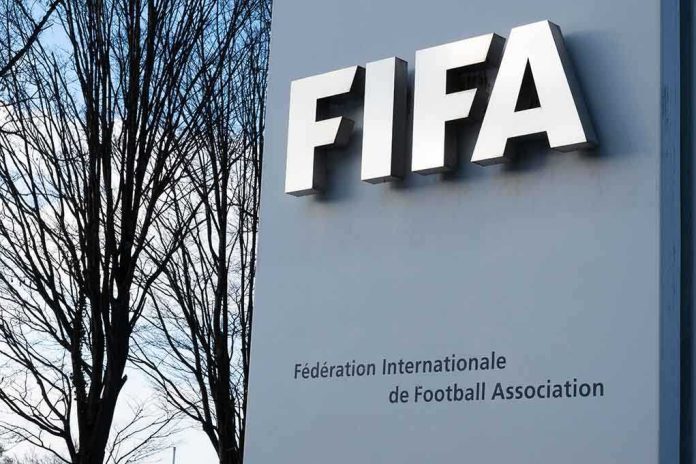
When a sitting U.S. president threatens to yank the World Cup from a city over its “communist” mayor, the world learns just how combustible the politics of sports can become.
Story Snapshot
- President Trump publicly threatened to remove Seattle as a 2026 World Cup host after a progressive mayor’s election win.
- The move spotlights the unprecedented intersection of presidential power, local politics, and global sport.
- FIFA, not the White House, has final say—yet federal support and security are now in question.
- The fallout stirs economic, political, and reputational risk for Seattle and the broader U.S. host effort.
Trump’s Threats Ignite a New Arena: The World Cup as Political Battlefield
The 2026 FIFA World Cup, set to be the largest in history, was meant to showcase American hospitality and unity on a global stage. Instead, it’s become a lightning rod for political power plays. On November 18, 2025, President Donald Trump—never one to shy from spectacle—warned that Seattle could lose its games after the city’s newly elected, progressive mayor took office. Labeling the winner a “communist,” Trump framed the threat as a warning to all “Democrat-run” cities: cooperate with his administration’s vision or risk losing out on hosting rights.
The move was as theatrical as it was direct. Trump’s history of politicizing sports is well documented, but even seasoned observers were jolted by the sheer audacity of the threat. FIFA’s host city protocols require local government cooperation and security assurances, but never before has a U.S. president leveraged an international event so openly to punish a city’s electorate. The backlash was swift: Seattle officials decried the threats as baseless and politically motivated, while some FIFA representatives privately signaled concern over the precedent being set.
Presidential Power: Real Leverage or Political Theater?
Presidents have rarely waded into the logistics of global sports events. Trump, however, has made a career out of challenging norms. The reality: the U.S. president cannot unilaterally remove a city from FIFA’s list. Only FIFA’s executive committee holds that authority. Yet, the federal government is crucial for event security, visas, and logistics. By threatening to withhold cooperation, Trump wields indirect—but very real—leverage. Legal experts and sports business analysts agree: unless federal support is pulled, FIFA is unlikely to delist Seattle. Still, the uncertainty leaves organizers on edge.
Seattle’s mayor-elect, already a lightning rod for conservative media, responded by reaffirming the city’s commitment to hosting and accused the president of political grandstanding. Local businesses and soccer fans, meanwhile, braced for what could become a costly showdown, with tourism revenue and civic pride in the balance. The spectacle raises uncomfortable questions about the future: will progressive cities be frozen out of hosting major events if the political winds shift in Washington?
Economic and Social Fallout: Who Stands to Lose?
The short-term impact is anxiety and confusion for Seattle’s World Cup stakeholders. Investments in stadium upgrades, transportation, and hospitality are now shadowed by uncertainty. For hotels, restaurants, and local workers, the prospect of losing an event projected to generate hundreds of millions in economic activity is chilling. Beyond the dollars, there’s the reputational risk: can the U.S. be trusted to host globally inclusive events when politics threaten to override merit?
Other U.S. host cities—especially those with left-leaning leadership—watch closely. The message is clear: step out of line, and your city could be next. Such brinkmanship could deter cities from bidding for future events, chilling the diversity and vibrancy that international tournaments thrive on. FIFA, for its part, remains officially silent but is reportedly monitoring the situation, keenly aware that its own reputation is at stake if host selections appear politicized.
Expert Analysis: The Limits and Dangers of Politicizing Sport
Sports governance scholars warn that Trump’s threat, even if ultimately toothless, risks eroding the apolitical tradition that underpins international sporting events. Legal analysts note that while the president can complicate federal support, he cannot directly dictate FIFA’s choices. Political scientists, meanwhile, see the episode as part of a broader trend: the blurring of lines between civic celebration and partisan warfare.
Some commentators dismiss the threat as political theater—yet history is littered with moments when bluster became policy. Until FIFA speaks, the uncertainty persists. Seattle’s preparations continue, but the shadow of presidential intervention lingers. The world is watching: will global sport bend to the whims of American politics, or will it reaffirm its autonomy in the face of powerful, unpredictable actors?
Sources:
SportBible – Donald Trump Threats Mexico Seattle Host Cities Chaos
Sports Business Journal – Trump Warns World Cup Host Cities
Sports Illustrated – Can President Trump Move 2026 World Cup Games?
Truthout – Trump Threatens to Move World Cup Out of Seattle







